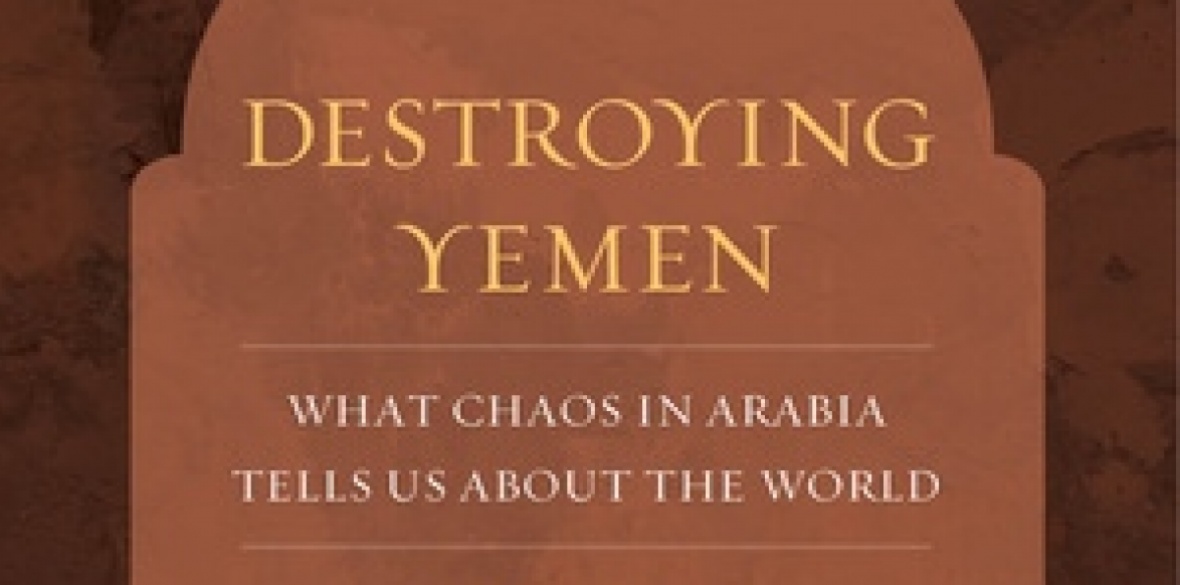This is the last article you can read this month
You can read more article this month
You can read more articles this month
Sorry your limit is up for this month
Reset on:
Please help support the Morning Star by subscribing here
Destroying Yemen: What Chaos in Arabia Tells us about the World
by Isa Blumi
(University of California Press, £24)
IN THE final pages of Destroying Yemen, its author Isa Blumi quotes a tweet by a Yemeni “patriot,” well-known but unnamed: “Rule number one of Arabian fight club: Don’t Fuck with Yemen. Rule number two of Arabian flight club: Do Not Fuck with Yemen.”
The language is blunt but the point is clear. After four years of war, the Western-backed Saudi coalition has not dislodged the Houthi movement from the capital Sanaa or the strategic port of Hodeidah.
In what Blumi sees as a war of plunder for a system of financial capitalism on the brink of collapse, defeat in Yemen will be potentially fatal for it, most of all for the Saudi regime in Riyadh. Yemen may be physically destroyed and its people starving but defeat in south Arabia could see the Saudi state disappear into the annals of history.
Blumi, a lecturer in Turkish studies at Stockholm University, wants to upend the Western and Arabic media narrative of the Yemen war in which “Iran-backed rebels” are fighting a coalition supporting “the internationally recognised government” of Abd Rabbuh Mansour Hadi.
The author describes a war with origins a century old that has little or nothing to do with Iranian expansion or terrorism and everything to do with eliminating resistance to the Western-backed Arab Gulf states.
The book is an honourable addition to the kind of radical anti-colonial political economy exemplified by Egypt-born Marxist Samir Amin. In part a polemic against financial globalism, this is no dry academic exercise but rather a thoroughly researched and heartfelt intellectual missile to be lobbed over the wall of Western analytical group-think on the Middle East.
Yemen and Yemenis have never been fully integrated into the global capitalist economy, Blumi argues, and this presents an ongoing challenge to empire that the latest Western-backed war has attempted, but failed, to solve.
With a history as a trading people with a centuries-old mercantile network stretching across south-east Asia, and a skilled workforce that helped build Arabia and the British empire, Blumi sees Yemenis as the hidden glue in a global economy that has nevertheless marginalised and exploited them.
Britain, which held the port of Aden since the 19th century, is the imperial power that for more than a century had sought to end Yemen’s independence and incorporate it fully into the imperial economy.
From the first world war, when Britain imposed a naval blockade on Yemen’s Red Sea ports, it allied with the newly installed Ibn Saud dynasty against Yemen and continues to do so all the way until Mohammed bin Salman’s devastating war starting in 2015.
North Yemen’s first ruler, Imam Yahya, was murdered in a 1948 coup but the British backed “modernist” Abdallah al-Wazir, the new imam, failed to hold onto power and Yahya’s charismatic son Ahmad was soon installed.
Ahmad secured aid from the communist bloc, which came with few strings, while resisting the crude bribery attempts of the United States’ emissaries — which, Blumi points out, had worked very well in Saudi Arabia — and whose racism was a major impediment to winning over Yemen’s proud rulers.
The persistent misperception, fed by racism, of Yemen as a land of “primitive tribes” by British and US agents is a running theme in the book.
Blumi sees the rule of Imam Ahmad (1948-62) as part of an anti-colonial Islamism that stood in total opposition to the Wahhabi version of ultraconservative Islam that Saudi Arabia implanted across the Islamic world as part of a Western-backed cold war against communism. This, and circulating its oil profits through London and New York, formed the Gulf rulers’ loyal service to empire.
Ahmad was killed in a 1962 republican coup that ushered in an Egyptian occupation and war — sometimes described as president Gamal Abdel Nasser’s Vietnam — that lasted until 1970.
With the Saudi oil boom providing huge remittances from Yemen’s expat Gulf workers, the 1970s were something of a golden age until the seizure of power by young army officer Ali Abdullah Saleh in 1978.
He was a wily operator who managed to plunder the country while also playing the Gulf states against one another and signing deals with Western oil companies to exploit Yemen’s great untapped oil wealth.
Blumi is excellent in revealing clearly how the machinations to federalise Yemen and carve out the exploitable oil-rich regions, along with policies to sell off the formerly communist South Yemen state’s assets, led rapidly to disillusionment with unification.
The uprising of 2011 in Yemen was a natural reaction to attempts to plunder the country’s economy by its long-time ruler Saleh in cohorts with the Saudis, Qatar and Western powers.
Gulf states had provided the logistical support for militant groups including al-Qaeda in the Arabian Peninsula and the Islamic State, none of which have roots in the Sufi-oriented Islam of Yemen.
The Houthis, or Ansar Allah, had fought six wars against Saleh in their north Yemen mountain stronghold and were aligned with the broad democratic and social justice goal of the popular movements that took to the streets in 2011 and once more against the Hadi regime in 2014, argues Blumi.
Which brings us to today. The war is in stalemate, the country is in ruins and perhaps 150,000 are dead, more than half of them children who have died from hunger and disease. They are mostly forgotten by the outside world.
Nasser’s war in Yemen helped finish him. The same fate is destined for Bin Salman’s war in Yemen, predicts Blumi. Saudi Arabia's gamble to subdue Yemen quickly, dating from as far back as the 1930s, “has ultimately caught up with it.”











